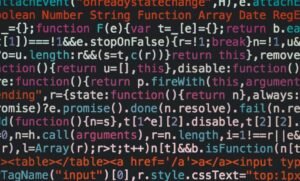Learn AI ML from Scratch
Artificial Intelligence (AI) and Machine Learning (ML) have become essential technologies in today’s modern world. Whether you want to build intelligent systems, analyze large datasets, or create innovative applications, having a solid foundation in AI ML is crucial. This article will guide you through the process of learning AI ML from scratch, starting from the basics and gradually moving towards more advanced concepts.
Key Takeaways
- Artificial Intelligence (AI) and Machine Learning (ML) are essential technologies in today’s world.
- Learning AI ML from scratch requires building a strong foundation in basic concepts.
- Practical hands-on projects are crucial for gaining real-world experience.
- Continuous learning and staying updated with the latest advancements is important in AI ML.
Getting Started
To learn AI ML from scratch, it is important to start with the foundational concepts. Begin by understanding the basics of AI, such as what it is and how it can be applied to various domains. **Machine Learning** is a subfield of AI that focuses on algorithms and statistical models that enable machines to learn and make predictions or decisions. **Python** is a popular programming language used extensively in AI ML. *Learning Python provides a solid starting point for AI ML enthusiasts.*
Necessary Skills and Knowledge
Building a strong foundation in AI ML requires acquiring certain skills and knowledge. Here are some essential areas to focus on:
- Statistics and Probability: Understanding statistical concepts and probability theory is essential for working with machine learning algorithms.
- Linear Algebra: Linear algebra plays a crucial role in understanding and implementing various ML techniques.
- Data Manipulation and Cleaning: Learning how to preprocess and clean datasets is important as it affects the performance of ML models.
- Machine Learning Algorithms: Familiarize yourself with popular ML algorithms, such as linear regression, decision trees, and neural networks.
- Evaluation and Validation: Learn about techniques for evaluating and validating ML models to ensure their accuracy and reliability.
Practical Hands-on Projects
Practical experience is vital for truly understanding and mastering AI ML. Engaging in hands-on projects allows you to apply your knowledge and gain real-world skills. Start by working on small projects and gradually scale up complexity. Experiment with various datasets and different ML algorithms to develop a diverse skill set. *Projects such as building a movie recommendation system or predicting stock prices can be fascinating and educational.*
Continuous Learning and Staying Updated
AI ML is a rapidly evolving field, and it is essential to stay updated with the latest advancements and trends. Continuous learning is crucial to remain effective and competitive as an AI ML practitioner. Engage in online courses, attend conferences and workshops, and participate in AI ML communities to stay connected with the global AI ML community. *Remember, the journey of learning AI ML is a lifelong process filled with exciting discoveries.*
Useful Resources and Platforms
When learning AI ML, there are several resources and platforms to assist you in your journey. Here are a few popular ones:
| Platform | Description |
|---|---|
| Coursera | An online learning platform offering a wide range of AI ML courses taught by experts from top universities and organizations. |
| Kaggle | A platform that provides datasets, competitions, and tutorials to practice AI ML skills and collaborate with others. |
| TensorFlow | An open-source machine learning framework widely used for building and deploying ML models. |
Final Thoughts
Learning AI ML from scratch requires dedication, continuous learning, and hands-on practice. By building a solid foundation in the basic concepts, acquiring the necessary skills, and engaging in practical projects, you can become proficient in AI ML. Remember to stay updated with the latest advancements and never stop exploring new possibilities. *Embrace the transformative power of AI ML and unlock a world of endless opportunities.*

Common Misconceptions
Learning AI ML from Scratch
There are several common misconceptions that people often have when it comes to learning AI and ML from scratch. Let’s address some of these misconceptions:
- It requires advanced mathematical knowledge: While having a solid understanding of math can be beneficial, you don’t need to be a math genius to start learning AI and ML. There are many resources available that explain these concepts in a beginner-friendly manner.
- It is only for computer science experts: AI and ML are becoming more accessible and can be learned by individuals from various backgrounds. You don’t necessarily need a computer science degree to get started. All you need is dedication and the willingness to learn.
- It is too complicated for beginners: While AI and ML can have complex concepts, there are many introductory courses and tutorials available that cater specifically to beginners. With the right resources and guidance, anyone can start learning AI and ML from scratch.
Practical implementation
Another misconception is that learning AI and ML is only theoretical and lacks practical applications. Let’s debunk this misconception:
- Real-world applications: AI and ML have found applications in various industries such as healthcare, finance, marketing, and more. By learning AI and ML, you can develop practical skills that are in high demand in the job market.
- Hands-on experience: Many learning platforms offer hands-on exercises and projects to help you apply what you’ve learned. This practical experience allows you to understand and implement AI and ML algorithms effectively.
- Open-source tools and libraries: There are numerous open-source tools and libraries available that make it easier to implement AI and ML algorithms in real-world scenarios. This allows beginners to get started with practical implementation without needing to build everything from scratch.
Learning time and commitment
Some people assume that learning AI and ML from scratch requires years of study and an enormous time commitment. Let’s clarify:
- Start small: You don’t need to tackle the entire field of AI and ML at once. Take it step by step and start with the basics. Once you have a strong foundation, you can gradually expand your knowledge and skills.
- Flexibility in learning: AI and ML resources are available in various formats, such as online courses, tutorials, books, and more. This flexibility allows you to learn at your own pace and fit it into your schedule.
- Continuous learning: AI and ML are constantly evolving fields. Rather than trying to learn everything at once, focus on building a strong learning habit and staying updated with the latest advancements.

Artificial Intelligence (AI) Job Market
An overview of the current job market for Artificial Intelligence (AI) professionals in selected countries.
| Country | Number of AI Jobs | Average Salary (USD) | Top Industries |
|---|---|---|---|
| United States | 21,000 | 120,000 | Tech, Healthcare, Finance |
| China | 18,500 | 95,000 | Finance, Manufacturing, Retail |
| India | 15,700 | 70,000 | Tech, Healthcare, E-commerce |
| United Kingdom | 9,200 | 110,000 | Tech, Finance, Retail |
AI Applications in Healthcare
An exploration of various Artificial Intelligence applications in the field of healthcare.
| Application | Description | Benefits |
|---|---|---|
| Medical Image Analysis | AI algorithms analyze medical images (X-rays, MRI scans, etc.) to aid in diagnosis. | Enhanced accuracy and early detection of diseases |
| Drug Discovery | AI models assist in identifying potential drugs and accelerating the discovery process. | Reduced time and cost for drug development |
| Virtual Nurses | AI-powered chatbots provide basic healthcare services and support to patients. | 24/7 availability and personalized care |
Evolution of Machine Learning Techniques
A timeline showcasing the major advancements in Machine Learning techniques over the years.
| Year | Technique | Significance |
|---|---|---|
| 1956 | Artificial Neural Networks | Early concept of simulating human brain function |
| 1990 | Support Vector Machines | Effective in complex classification tasks |
| 2006 | Deep Learning | Achieved breakthroughs in image and speech recognition |
Social Impact of AI
Examining the potential positive and negative societal impacts of Artificial Intelligence.
| Impact | Description |
|---|---|
| Improved Healthcare | AI can enhance medical diagnoses and treatments, ultimately saving lives. |
| Job Displacement | Automation may lead to job loss in certain sectors, requiring re-skilling and career transitions. |
| Ethical Concerns | Ensuring AI systems are developed and used responsibly to avoid biased or harmful outcomes. |
Natural Language Processing (NLP) Applications
Highlighting real-world applications of Natural Language Processing (NLP) techniques.
| Application | Description | Use Case |
|---|---|---|
| Chatbots | NLP enables chatbots to understand and respond to human queries or commands. | Customer support, virtual assistants |
| Language Translation | NLP facilitates automatic translation between different languages. | International communication, localization |
| Sentiment Analysis | NLP algorithms analyze text to determine attitudes or emotions expressed by the author. | Branding, customer feedback analysis |
AI Ethics Principles
An overview of the key ethical principles guiding the development and deployment of Artificial Intelligence.
| Principle | Description |
|---|---|
| Transparency | Ensuring AI systems are explainable and providing visibility into decision-making processes. |
| Accountability | Holding individuals and organizations responsible for the outcomes of AI systems. |
| Privacy | Safeguarding personal data and respecting individuals’ privacy rights. |
AI in Education
Examples of AI technologies and applications in the field of education.
| Technology/Application | Description | Benefits |
|---|---|---|
| Adaptive Learning Systems | Intelligent systems that personalize educational content based on individual student needs. | Improved learning outcomes and individualized instruction |
| Automated Essay Scoring | AI models that automatically grade and provide feedback on student-written essays. | Efficient assessment and timely feedback for students |
| Virtual Reality (VR) | Immersive experiences through VR technology, enhancing education through simulations. | Engaging and interactive learning environments |
AI Startups and Funding
An examination of the startup landscape in the field of AI and the funding received.
| Startup | Description | Funding Raised (USD) |
|---|---|---|
| OpenAI | Research-focused AI company aiming to ensure artificial general intelligence benefits all of humanity. | $1.9 billion |
| UiPath | Robotic Process Automation (RPA) software company automating repetitive tasks. | $750 million |
| DataRobot | Enterprise AI platform offering automated machine learning and predictive analytics. | $270 million |
Future Trends in AI Research
Exploring emerging trends and research areas in the field of Artificial Intelligence.
| Trend/Research Area | Description |
|---|---|
| Explainable AI | Focusing on developing AI systems that can provide transparent explanations for their decision-making processes. |
| AI for Social Good | Using AI to address societal challenges and promote positive social impact. |
| Quantum Machine Learning | Merging quantum computing and machine learning to enhance computational capabilities. |
Artificial Intelligence and Machine Learning are rapidly evolving fields with vast potential. The job market for AI professionals is booming, particularly in countries like the United States, China, India, and the United Kingdom. In healthcare, AI applications have revolutionized medical image analysis, drug discovery, and patient care. Throughout history, Machine Learning techniques have advanced from artificial neural networks to deep learning. While AI brings numerous benefits, it also raises concerns regarding job displacement and ethical considerations. Natural Language Processing finds its applications in chatbots, language translation, and sentiment analysis. Ethical principles guide the development and deployment of AI systems, emphasizing transparency, accountability, and privacy. AI’s impact extends to education, with adaptive learning systems, automated essay scoring, and virtual reality transforming learning experiences. Diverse AI startups have attracted substantial funding, propelling innovation in the field. As AI research progresses, future trends focus on explainable AI, AI for social good, and the fusion of quantum computing and machine learning.
Frequently Asked Questions
Question 1: What is artificial intelligence (AI) and machine learning (ML)?
Artificial intelligence refers to the simulation of human intelligence in machines that are programmed to think and learn like humans. Machine learning is a subset of AI that focuses on enabling machines to learn from and make predictions or decisions based on data without explicit programming.
Question 2: How can I start learning AI and ML from scratch?
To start learning AI and ML from scratch, you can begin by gaining a basic understanding of programming languages such as Python or R. Familiarize yourself with the concepts of data analysis and statistics. There are numerous online courses, tutorials, and resources available that provide comprehensive learning materials for beginners.
Question 3: What are the key prerequisites for learning AI and ML?
The key prerequisites for learning AI and ML include a fundamental understanding of mathematics and statistics, proficiency in programming languages (Python being highly popular), knowledge of algorithms and data structures, and a strong desire to learn and experiment with technology.
Question 4: Are there any free resources available for learning AI and ML?
Yes, there are several free resources available for learning AI and ML. Online platforms like Coursera, edX, and YouTube offer free courses and tutorials on AI and ML. Additionally, many websites and blogs provide articles, code examples, and open-source projects to help you expand your knowledge.
Question 5: What are the practical applications of AI and ML?
AI and ML have various practical applications across industries. They are used in image and speech recognition, natural language processing, autonomous vehicles, recommendation systems, fraud detection, healthcare diagnostics, and many more fields that require pattern recognition, prediction, and optimization.
Question 6: How long does it take to learn AI and ML from scratch?
The duration to learn AI and ML from scratch can vary depending on factors like your prior knowledge, learning dedication, and resources available. Typically, it may take several months to a year of consistent studying and practice to gain a solid foundation in AI and ML.
Question 7: Will I need a background in computer science to learn AI and ML?
While having a background in computer science can be beneficial, it is not a mandatory requirement to learn AI and ML. Many individuals without a formal computer science background have successfully learned and applied AI and ML concepts. However, a strong foundation in programming and computational thinking is vital.
Question 8: Are there any certifications available for AI and ML?
Yes, there are numerous certifications available for AI and ML. Reputable organizations and educational platforms offer certifications that validate your knowledge and skills in these fields. Some popular certifications include Google’s TensorFlow Developer Certificate, Microsoft Certified: Azure AI Engineer Associate, and IBM Data Science Professional Certificate.
Question 9: How can I apply AI and ML in real-world projects?
To apply AI and ML in real-world projects, you can start by identifying a problem or use case where AI or ML techniques can be beneficial. Collect relevant data, preprocess and clean it if necessary, and then apply suitable algorithms or models for analysis or prediction. Continuously evaluate and refine your models based on the project requirements.
Question 10: Are there any career opportunities in AI and ML?
Absolutely! AI and ML are rapidly growing fields, leading to numerous career opportunities. Industries like tech, healthcare, finance, retail, and manufacturing are increasingly in need of AI and ML experts. Roles in these fields include data scientists, machine learning engineers, AI researchers, and AI consultants.




